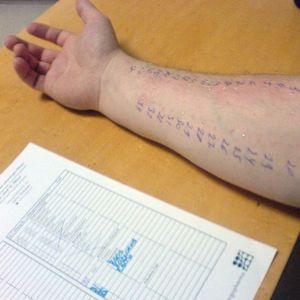Anyone who has ever been subjected to an allergy skin prick test can verify that it is not a pleasant procedure, particularly if you happen to be allergic to several different substances.
When your humble correspondent was a wee child, he underwent a skin prick test on his back. As its name implies, a doctor pricks the skin with a tiny amount of a suspected allergen, like cat hair. If an itchy, red bump appears, that means you're allergic to the substance. My back lit up like a Christmas tree because I was allergic to just about everything... except goats.
This childhood right of passage may be a thing of the past someday. New research has shown that a urine test can determine if a person has an allergy to a specific substance.
The "Sniff-and-Pee" Test
The researchers had volunteers (with known ragweed allergies) provide urine samples before and after nasal administration of ragweed. The volunteers also rated the severity of their symptoms (i.e., runny nose, nasal congestion, nasal itching, and sneezing). An analysis of the urine samples allowed the researchers to devise a biomarker profile consisting of 11 metabolites, providing a sort of biochemical "fingerprint" that was indicative of an allergic response. Thus, by measuring the concentration of metabolites in the urine, scientists could separate people with mild allergies from severe ones.
 The team then validated their model on a new set of volunteers. After ragweed administration, they measured the metabolites in their urine and plugged the values into their model. As they suspected, the model was able to predict -- using urinary metabolic biomarkers alone -- which of the patients were severely affected by ragweed allergies. (The figure depicts what is known as a receiver-operator curve. The closer the curve is to the upper-left corner, the better the diagnostic test.)
The team then validated their model on a new set of volunteers. After ragweed administration, they measured the metabolites in their urine and plugged the values into their model. As they suspected, the model was able to predict -- using urinary metabolic biomarkers alone -- which of the patients were severely affected by ragweed allergies. (The figure depicts what is known as a receiver-operator curve. The closer the curve is to the upper-left corner, the better the diagnostic test.)
Could a urine test replace the skin prick test? "Yes, this idea would hopefully replace the needles," wrote Dr. Darryl Adamko, the lead author of the paper, in an e-mail to ACSH.
However, there are obvious drawbacks. Having a runny, itchy, sneezy nose is not particularly enjoyable, so people may prefer the skin prick test. Also, while the skin prick test can assess a person's reaction to dozens of allergens at once, the urine test can only assess one allergen at a time.
Still, this proof of concept is a step toward a future where patients can at least be presented with an option: "Would you like the ragweed up your nose or under your skin?"
Source: Darryl J. Adamko, Mona M. Khamis, Lisa M.Steacy, Shana Regush, Rhonda Bryce, Anne K.Ellis. "Severity of allergic rhinitis assessed by using urine metabolomic profiling: Proof of concept." Journal of Allergy and Clinical Immunology. Published online: 17-April-2018. 10.1016/j.jaci.2018.02.051




